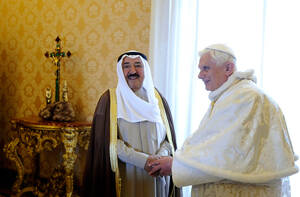In February, Kuwait’s newly formed al-Adala (“Justice”) Bloc introduced legislation to remove Christian churches and impose Islamic Shariah law. Party officials said later the legislation would not remove existing churches but would prohibit further construction of non-Muslim places of worship. The legislation also introduces Islam-inspired measures to fight corruption and “strengthen national unity.” On March 12 Bishop Camillo Ballin, the Italian-born apostolic administrator of Kuwait, called the proposals “out of step with the traditions of Kuwait, which seeks to be an open, tolerant country welcoming other religions besides Islam.” He said such proposals emerge “from ideologies which want to divide the world between Muslims and non-Muslims.” According to Bishop Ballin, al-Adala’s claims that there were more churches in Kuwait than needed by its Christian minority were untrue, taking account only of the small number of Christians who were ethnic Kuwaitis. “When religious life is assured, social life is also easier—so why can’t our foreign members have a place for worship?” the bishop asked.
Christian Restrictions in Kuwait
Show Comments (
)
Comments are automatically closed two weeks after an article's initial publication. See our comments policy for more.
The latest from america
Los Angeles Archbishop José H. Gomez was one of several community leaders who joined to open the Family Assistance Program, aiding those affected by recent ICE raids.
On Friday, Pope Leo XIV issued a statement on the theme "Migrants, missionaries of hope."
In Steven Spielberg’s “Close Encounters of the Third Kind,” an ordinary electrician has a transcendent encounter—with U.F.O.s, not God.
Many of my acquaintances have given up “reading about something that didn't happen.” But fiction has long-term and concrete value, both mentally and socially.








